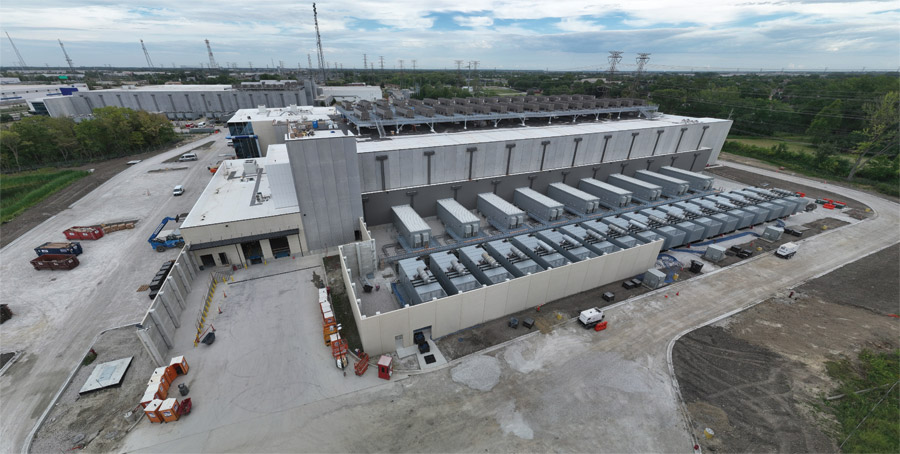Although Chicago-based Clune Construction didn’t set out to dramatically expand its regional revenue in 2023, the company’s Midwest team did exactly that thanks to a combination of smart decisions and some great timing.
Midwest regional revenue came in at $822.62 million last year, more than double 2022’s take of $400.70 million, propelling Clune to No. 25 on ENR Midwest’s 2024 Top Contractors ranking, up from No. 32 last year.
“It was a few years of planning to get there, and it just happened to hit in 2023,” says Dave Hall, Clune’s CEO. “It really has to do with the data center boom in Elk Grove Village and the western suburbs of Chicago. We’ve been chasing these projects, shifting teams, training people and hiring to be ready for it. And it all just came all at once, which is fantastic.”

One of the 12 studios Clune completed for Barstool Sport’s new West Loop office in Chicago.
Photo by Kendall McCaugherty
Shifting Sectors
Across four primary markets served—aviation, health care, mission critical data centers and interior/tenant improvement—Clune’s teams adapt to market fluctuations.
“When the firm originally started [in 1997], we were a tenant/interior contractor. That was our only vertical,” says Vince Gutekanst, Midwest president and executive managing director at Clune. “As we started to evolve, we realized we’ve got to try to expand a little bit into other verticals. Then came the mission critical data center market and then aviation and health care.”
Before the pandemic, about 75% of the firm’s work was in the tenant/interiors space, with about 20% in mission critical. Today, tenant/interiors projects account for closer to 30% of overall work, as that market remains depressed but highly competitive in the face of the changing work landscape, while data center work has jumped to more than 50%. Clune diversified into health care about a decade ago and has led projects such as a 15,000-sq-ft hospital simulation center in Lake Forest, Ill.
“We have grown a lot, but it’s always been a focus on excellence and not allowing us to be a commodity.”
—Dave Hall, CEO, Clune Construction
In aviation, while Clune isn’t building infrastructure, “we’re taking what we did really well, our tenant and interiors background and DNA, and building within the airport,” says Joe Van Oosbree, managing director of Chicago operations at Clune. The firm has worked on a variety of hospitality improvement projects at both O’Hare and Midway airports in recent years.
Meanwhile, mission critical work has exploded, in part due to a tax incentive passed by the state of Illinois in 2019, but also thanks to Clune’s leadership in realizing that mission critical was the space to pivot into as other sectors slowed. That vertical became a catalyst for growth in 2023, Gutekanst says.
“We had a great leg up because we had been in the space for a couple of years before it really took off. With our experience and track record, we continued to gain traction with our clients. They saw it, and more opportunities started to come in,” he says.
But the company’s strategic plan doesn’t specify growth for growth’s sake. “When I started, we had 40 employees, now we have almost 800—so yes, we have grown a lot, but it’s always been a focus on excellence and not allowing us to be a commodity,” Hall says.
That means not being afraid to turn down projects and clients that aren’t the right fit. “Plenty of customers are just bottom line driven—they’re probably not for us and we’re not for them,” he says.

A recently completed 310,000-sq-ft, 48-MW ground-up data center in Aurora, Ill.
Photo courtesy of Clune Construction
People First
As an ESOP, Clune’s team has an advantage, according to Hall. “My entire reason for doing my job is to make life really good for our people and their families,” he says. “I can do things that other CEOs can’t do. We had a really good year, so we gave quite a few million dollars of extra bonuses out because our employees are our shareholders.”
This philosophy carries over to the numerous benefits Clune ensures for each of its people, such as paying 100% of all health benefits for all employees and their families and helping pay off student loans.
But ongoing talent shortages have certainly had an impact. Although the company saw its regional revenue double in 2023, revenue could have actually tripled.
“We turned down almost a billion dollars worth of work last year just because we can't find the people to do the work,” Hall explains. “We could take more on than we do, but again, the metric I live by is how are my employee-owners? What is their life like? We don’t have to grow—the only reason we grow as a company is because it creates opportunities for our people.”
“Clune is highly responsive, organized and maintains strong attention to detail.”
—Jonathan Gibbs, Executive Vice President, Product Delivery, Prime Data Centers
Clune’s team believes that it’s better to maintain a solid reputation for good, well-performed work rather than to overextend and potentially make mistakes on jobs.
But there are some strategies that are helping Clune lessen the impacts of the war for talent, such as bringing recruiting efforts in-house with several dedicated acquisition specialists. “We just found that external recruiters don’t have the same incentive as an internal talent acquisition person,” Hall adds. “It’s been hugely helpful.”
Pivoting team members from slower markets such as tenant/interiors over to the growing mission critical vertical has also been successful. “To us, it’s about teamwork and making sure that if we do pivot people into another market, we support them with everything we’ve got,” Gutekanst says. “That strategy has paid off immensely to help bridge that talent gap,” as have a robust internship program and an expansive focus on professional development across all levels of the organization.
Before the data center tax credit went into effect, many of Clune’s teams in the space were building in Atlanta; Dallas; Columbus, Ohio; and Phoenix, following mission critical booms in those locations, but now they have been able to shift back to their home turf and help in the Midwest as well.
While some contractors aim to hire for one project or for the short term, Clune’s goal is to hire individuals who will become lifelong employees.
“Recently, our founder, Mike Clune, bumped into one of the major headhunters in the area, and the gal just said straight out, ‘I don’t even try to steal people from Clune any more. Your people don’t leave,’” Hall says. “We try really hard to keep the best people here.”

Clune employees volunteer at the Greater Chicago Food Depository, which provides food and programs aimed at ending hunger across Chicago and Cook County.
Photo courtesy of Clune Construction
Keeping Busy
At Salesforce Tower Chicago—a new 60-story, 1.2-million-sq-ft Class-A office building—Clune completed a 675,000-sq-ft, 27-floor build-out for a repeat law firm client earlier this year. Although an outlier in the slowing tenant/interiors market, this was largest such project in Chicago in the past year, Gutekanst notes.
Other work across the city completed in 2023 included the Guinness Open Gate Brewery project, which transformed a vacant rail depot into a 15,000-sq-ft brewery and restaurant, and the two-story, 40,000-sq-ft Barstool Sports Chicago office, now home to broadcast and podcast studios, a basketball court and other amenities.
For more than 20 years, Clune has partnered with Ernst & Young LLP (EY) on a range of projects, mostly through a competitive bid process. The most recent was the build-out of EY’s new Chicago office at 155 N. Wacker Drive. Construction was just about to start when the pandemic struck, leading to a lengthy pause.
“We realized that the design had to be completely revamped to align with the way we envisioned our people working post-pandemic. Clune patiently worked with us and Perkins+Will, our architect, to reprice the entire project numerous times, offering value engineering and speed-to-market suggestions,” says Victoria M. Kim, region real estate design and projects leader at EY. “We ended up with a flawlessly executed project.”
Meanwhile, multiple confidential data center projects with clients such as Prime Data Centers, T5 and Server Farm, to name a few, have further bolstered Clune’s burgeoning regional portfolio.
“In addition to aligning with Prime Data Centers’ core commitments to safety and sustainability, Clune is highly responsive, organized and maintains strong attention to detail, resulting in projects that are on-time and on-budget,” notes Jonathan Gibbs, executive vice president of product delivery at Prime.
Although these mission critical projects may look similar, each has its own challenges and characteristics. “One of the cool ones we’re working on is out in Itasca,” Van Oosbree says. “We’ve maintained that client relationship since 2019—we’re still there on the same campus doing work as they grow and continue to invest in that area.”
Priority: Safety
One of Clune’s major successes in 2023 was its vastly improved safety record. In 2021, the firm’s total recordable incident rate (TRIR) was up to 1.05, which was not acceptable, Hall says.
“We grew, as I think the entire industry did, from being a reactive organization to being a lot more proactive, really planning safety into the job and empowering all of our employees,” he says. “Every single employee at Clune can stop a job at any time and is encouraged to do so.”
Renewed focus on ensuring safety training for every employee has helped build awareness and full team buy-in to the company’s safety program. Collectively, these efforts helped bring Clune’s TRIR down to 0.53 in 2022, across 1.5 million work hours, and to 0.24 in 2023, across 1.7 million work hours—that included just two recordable cases and no lost-time incidents.
“A recent focus on high-risk activities, energy management and more proactive activity in the field by our project teams has helped our safety program reach new heights,” explains Mike Themanson, Clune’s vice president of safety. “We look at our leading and lagging indicators to measure the effectiveness of our safety program. Leading indicators are measured by utilizing our newly implemented SiteDocs software to perform safety audits and observations on our projects.”
With a strong backlog of work and ample opportunities ahead across the Midwest, Clune is poised to continue its growth—intentional or not.
“It’s never been our strategy to increase our revenue any more than anybody else. It’s all about long-term sustainable growth and profitability and the well-being of our employees,” Hall says. n




